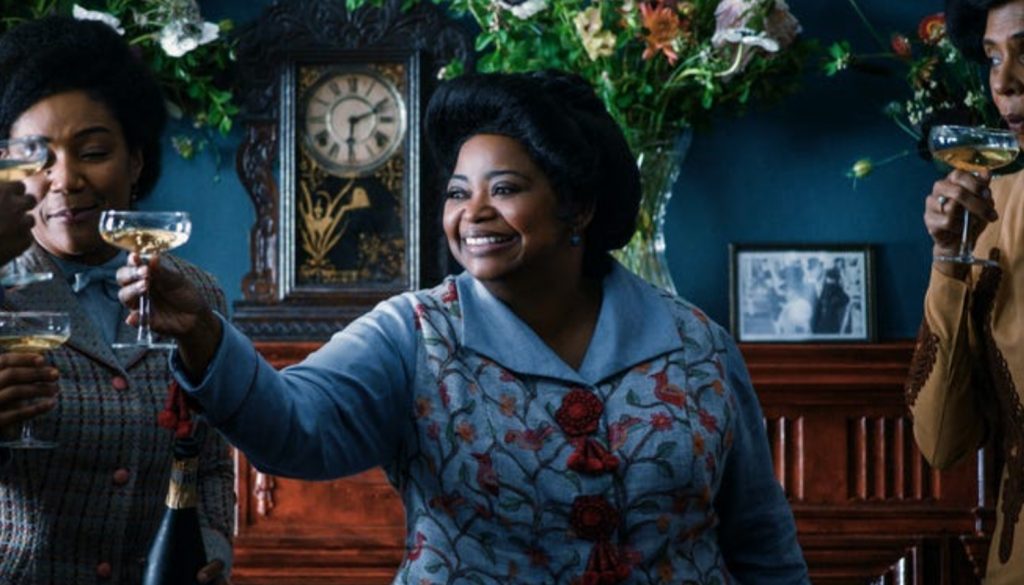Meet Sarah Breedlove, the rags-to-riches heroine whose story has gone too often untold, until now. In a new historical fiction miniseries starring Octavia Spencer, Netflix sets out to show what it takes to be the first self-made female millionaire in America, and as a black woman living in the 19th century, no less. While Spencer’s Oscar-winning acting is without question the series’ best feature, “Self-Made” ends up paying poor tribute to the meaning of independence and empowerment.
As a washer woman making barely a dollar a day and working so strenuously that her hair starts to fall out, Sarah feels that she has hit rock bottom. But she dreams of a better life, not just for herself, but for all black women. After receiving transformative treatment from hair expert and entrepreneur Addie Monroe (Carmen Ejogo), Breedlove begins to pursue her own ambitions in selling hair products, even after Monroe refuses her partnership. Despite the rejection, she pushes on. Her new marriage and business christen her Madam C.J. Walker, whose products make her a household name.
So far, the series’ message about hard-earned success is an inspiring one: have a big dream and pursue it tirelessly, always taking risks and never taking no for an answer. What leads the film downhill is its hyperfocus on cutthroat rivalry, embittered relationships, and severed bonds, all packaged as heroic battle scars earned in the fight for glory. In the world of “Self-Made,” business is war, and to survive, one must tolerate the casualties and march on, no matter the cost.
It would be one thing for Spencer to deliver a few satisfying zingers against injustice, but it’s quite another to see her character sucked into a ruthless business style that makes her intimidating to friend and foe alike. Her fixated attention on her one pursuit — unsurpassed growth that launches her into fame and makes her an inspiration to black women — is painted as powerful, and to a certain extent it is. But after a while, it grows wearisome. It makes Walker impressive, but not likable.
The headache worsens as Walker’s pursuits strain her family relationships. Her daughter, Lelia (Tiffany Haddish), feels overlooked and misunderstood, and Walker barely notices her fraying marriage and homosexual escapades until very late in the series.
Similarly, the rising businesswoman fails to see her husband C.J.’s (Blair Underwood) growing discontent with their changing lifestyle until she actually walks into his lover’s bedroom. C.J.’s betrayal is born of jealousy, pride, and a failure to voice his feelings to his wife. But in the end, both spouses give up on the beautiful love they once had.
In one brief yet telling scene, C.J.’s father Cleophus (Garrett Morris) confronts him after suspecting him of adultery. He reminds him that faithful marriage isn’t easy, but it’s crucial for happiness. “You wanna know how me and your mama managed to stay together?” he says. “I wanted to be married.” He then describes how when he would visit his wife on the neighboring plantation, they both made sure to dress up as much as possible, despite their destitution and the infrequency of their meetings. “Point being, I tried,” he stresses. “She tried.” Sadly, old Cleophus’ advice falls upon deaf ears, and his character mysteriously fades from the story soon afterwards.
Both Walker and C.J. are hardworking people, but their marriage is one thing neither of them are willing to work on. Equally caught up on their individual goals, they soon see each other not as partners but rivals. This would be tragic in itself, but the greater disappointment of “Self-Made” is that it does not make their fate seem so tragic. Sarah initially feels devastated and hurt, but after reaching the heights of wealth and fame, her divorce is barely counted as a loss of love. On the contrary, it becomes an asset to her success: she is a truly independent woman economically, legally, and personally. Marriage, according to this film, only held her back.
The real Walker indeed had many impressive and noble accomplishments. She created tens of thousands of jobs. She donated generously to social and academic institutions such as the NAACP and the Tuskegee Institute. She built a business empire that lifted the prospects and the confidence of African Americans across America and beyond. But instead of spotlighting these contributions to society and history, this series dramatizes ugly battles among family and friends and makes betrayal, scandal, and revenge the central focus of Walker’s rise to success. In this film, the battles for independence from men, marriage, sexual norms, and the “weakness” of compassion and forgiveness are the noteworthy crusades.
Such crusades show us a woman who built the business of her dreams, but at a terrible price: the destruction of a united and happy family. That is not an inspiring legacy to pass on about America’s first female self-made millionaire, nor is it a formula for true success in life, self-made or otherwise.

